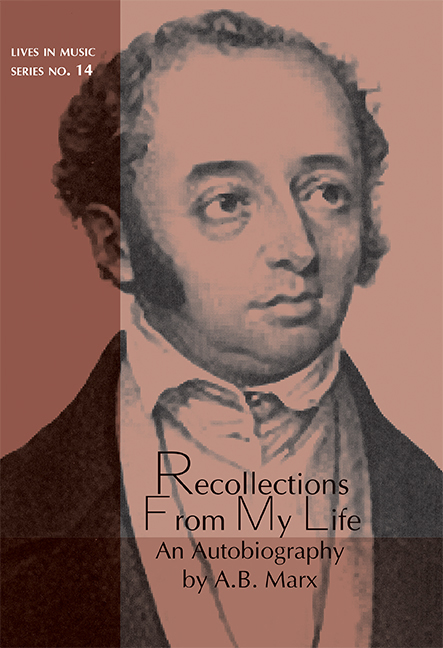Book contents
- Frontmatter
- Contents
- Introduction
- Select Bibliography
- Contents of Volume One
- 1 My Father's House
- 2 Musical Beginnings
- 3 War
- 4 Starting with Composition and Theory
- 5 The Theater in Weimar
- 6 War, again
- 7 The University
- 8 Early incentives for the practice of law
- 9 Legal practitioners
- 10 From Halle to Naumburg
- 11 To Berlin
- 12 Berlin
- 13 Fata Morgana
- 14 Personal relationships
- 15 The Berlin Opera at its height
- 16 Spontini
- Contents of Volume Two
- Afterword in place of foreword
- Translator's Note on Indexing
6 - War, again
from Contents of Volume One
- Frontmatter
- Contents
- Introduction
- Select Bibliography
- Contents of Volume One
- 1 My Father's House
- 2 Musical Beginnings
- 3 War
- 4 Starting with Composition and Theory
- 5 The Theater in Weimar
- 6 War, again
- 7 The University
- 8 Early incentives for the practice of law
- 9 Legal practitioners
- 10 From Halle to Naumburg
- 11 To Berlin
- 12 Berlin
- 13 Fata Morgana
- 14 Personal relationships
- 15 The Berlin Opera at its height
- 16 Spontini
- Contents of Volume Two
- Afterword in place of foreword
- Translator's Note on Indexing
Summary
And ever more wildly the overwhelming waves of public life washed into the small eddies of our private life. It was really a time, this time of Napoleon, that one can barely imagine now, in spite of all the historical evidence. Always and everywhere war, armies from and toward every direction of the compass. Here is the procession of the victorious, there the procession of the prisoners, here the princes, who “have ceased to reign”, that Napoleon had summarily removed — there a crowd of new kings and princes, whom he had promoted from being sons of lawyers, and even from being cooks and stable boys, to the throne. The main current remained, however, that from west to east toward Moscow, and then — back! To Paris, until the overthrow of the mighty, whom, truly! not the power of man, but clearly that of a Higher Power had laid low. And all of this whizzed past our little Halle, as the great military highway required.
The harbingers of the reversal were already before our eyes. We already heard the incomprehensible news, after the Peace of Tilsit, that “the Prussians are coming”, and one night we were woken by the noise of horses’ hooves and the back and forth of lively voices in high pitches, and the short and choppy way of speaking that are so characteristic of the sturdy residents of Pomerania and Brandenburg. Riders with bright military outfits rode up and down before our windows; they belonged to Schill, whose name had a fine reputation at that time in Germany, and who was generally known as the “Knight of Queen Louise”. His daring undertaking and dismal end moved every heart; from Halle as well many capable young men had joined his fine band.
And soon we also heard of the happier platoon of the Duke of Braunschweig-Oels. He also came through Halle, in order to reach the seat of his father and the mouths of the Weser, where the rescuing English ships were waiting for him.
- Type
- Chapter
- Information
- Recollections From My LifeAn Autobiography by A. B. Marx, pp. 32 - 37Publisher: Boydell & BrewerPrint publication year: 2017



